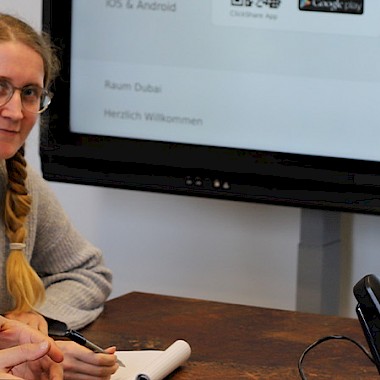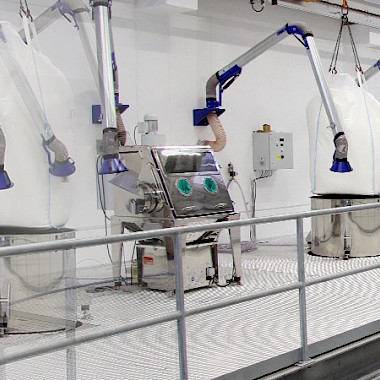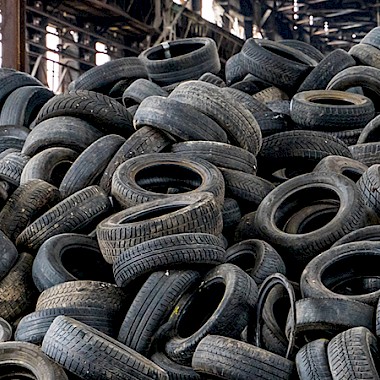Vocational Training at KBT in Duisburg
The Experts of Tomorrow
They are the future of Kubota Brabender Technologie. We have been training mechatronics engineers at our company headquarters in Duisburg since 2022. At the moment, we are teaching two trainees everything they need to know about mechanical and plant engineering – from mechanics to electronics and IT. One of these future experts joined us in September 2024.
Competent and dedicated specialists are the most important basis for high-quality production... and so the company's success. During their training period, our trainees and Kubota Brabender Technologie get to know each other well. This means there are no unpleasant surprises – only opportunities for the future.
Two is better than one: dual education
Most vocational training in Germany takes place in the dual education system. In this system, students are taught at two places: at the vocational school and in the company. While the vocational school provides the necessary basic knowledge and theoretical background, the training in the company provides applied experience and practical skills. This ensures that future specialists are optimally qualified.
As a rule, education lasts three and a half years; students spend three to four days a week at the company and the remaining days at the vocational school. Our trainees Niklas Kösseler and Fabien Python attend the Robert Bosch Vocational College in Duisburg, which, as our dual partner, teaches general and subject-specific content for apprenticeships in the field of electrical and metal engineering. Here, our trainees acquire electrical, mechanical, hydraulic and pneumatic knowledge.
Education and career entry as a mechatronics engineer
We only train apprentices we intend to employ at our company. As a training company, we have the opportunity to specifically prepare our future employees for working with us – and to also benefit from their fresh ideas and perspectives right from the start. Our experts of tomorrow grow familiar with the workflows and processes at Kubota Brabender Technologie and establish an excellent basis for their future work in our company.
At the same time, it is our declared goal to provide our future employees with skills that are relevant not only for our company in particular, but for the entire economy. Comprehensive and generally applicable knowledge is extremely important for a long and successful career.
Accordingly, our trainers Philipp Biegelbauer (Test Bay Department) and Sebastian Bengs (Electronics Development Department) teach our trainees to become versatile and competent mechatronics engineers who can produce mechatronic components and systems. This exciting, complex and versatile field deals with systems that combine mechanical, electronic and software components – such as industrial robots, modern automobiles, and our high-quality feeding solutions.
Learn and experience professional practice
As mechatronics engineers in training, Niklas and Fabien gain practical experience in our departments mechanical and electronic design, control cabinet production and final inspection or test bay. They also spend time in the Technical Center, where they experience product tests that demonstrate our devices' functionality and areas of application, and learn how to design solutions for specific customer requirements from our experienced specialists. At the end of their education, they will be able to fully assemble our equipment, wire it, and also conduct the final quality inspection to ensure that the new systems meet our strict quality standards.
In addition to metalworking, wiring and mechanical and electronic construction, the practical skills that Niklas and Fabien learn during training in our company include an understanding of system control via PLC interfaces as well as testing even large systems by means of network tests.
"Wanderjahre" in Norway
In the Middle Ages, journeymen traveled long distances to gain life experience, get to know new places and countries, and deepen their knowledge. Fabien, our third–year trainee, was able to embark on a very similar – albeit much shorter – trip in May 2024. The son of a long-time employee completed an internship in Norway through the Erasmus+ educational program and our dual partner, the Robert Bosch Vocational College.
From 05 to 15 May, Fabien attended a technical school in Egersund on the impressive Dalane coast in southwestern Norway. The school offers both technical vocational training and general secondary school qualifications. Here, he learned welding techniques, developed complex circuit diagrams, and worked on several technical projects that expanded his knowledge as a mechatronics engineer, opening new perspectives. Gathering general life experience was also an important part of the trip – he had enough time to explore the impressive Norwegian nature and get to know the country and people. The travel costs were covered by Erasmus+, and Fabien received expenses from Kubota Brabender Technologie as "pocket money" for the trip's duration.
Vocational education through the ages
Guilds in the Middle Ages
In Germany, vocational education has been regulated as far back as the Middle Ages. Craftsmen united in guilds that served to safeguard the common interests of the respective profession, and that also controlled education. As part of the guilds' training system, an apprentice was usually accepted into the master's household, where he took part in family life while he learned a certain trade – that of a tailor, baker or blacksmith, for example. The apprentice had to pay an apprenticeship fee for his training. The amount in question was determined by either the guild or the teacher himself.
From apprentice to journeyman and master
The apprentice completed his training by passing the journeyman's examination, which was conducted by the guild. As a journeyman, he was allowed to practice his learned profession independently. However, a craftsman could only become a master after he had passed his journeyman years – the so-called "Wanderjahre", or years of wandering. In the years of wandering, he gained experience by traveling to more distant masters of his craft, deepening his knowledge and growing acquainted with new crafting practices and regions. By passing the master's examination, the craftsman finally became a master – and only now was he entitled to full guild and civil rights.
Industrialization
With the Industrial Revolution, the medieval guild system in Germany came to an end. Large companies, factories and free competition now dominated the economy. With the guilds, the traditional model of education was also abolished, and the trades as a whole struggled to survive.
Birth of the dual concept
At the end of the 19th century, the German empire transferred the responsibility of regulating vocational education to the Chambers of Crafts. The trade law amendment of 1897 intended to stabilize and reorganize the trades – and added a second "pillar" to classic vocational training: the training school. Training or continuing education schools have existed since the 18th century in the form of Sunday schools and commercial institutions dedicated to training craftsmen.
Dual education today
In the Federal Republic, education became consistently regulated nationwide. Here, laws established the state vocational school as a second place of learning alongside on-the-job training in the company. This dual training system has established itself not only in Germany, but also in Switzerland, Austria and Denmark, among other countries.


